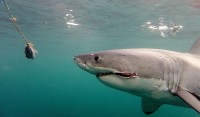Slash, the shark with attitude
Author: Olivia Carville Source: www.stuff.co.nz Website: Visit Website Date:Tuesday, 3 December 2013
A massive great white shark that roams New Zealand waters with a "bad attitude" was the poster boy for this year's Discovery Channel Shark Week.
The five-metre beast - known as Slash - has a grisly gash snaking out the side of his mouth and was touted as a "local legend" by the documentary-makers.
Part of Sunday night's episode, which opened Shark Week 2013, was filmed off the coast of Stewart Island - a location that was introduced as "home to some of the biggest, most aggressive great whites on the planet".
The episode, titled Great White Serial Killer, had more than 3.2 million viewers worldwide.
Shark Dive NZ owner and operator Peter Scott, who featured in the documentary, said Slash was the most aggressive great white he had encountered.
His bloody scar, which was likely to heal one day, was the result of a botched tagging project by the Department of Conservation (DOC) and the National Institute of Water and Atmospheric Research (Niwa) to track the shark's movements.
"This clearly changed his attitude and it appears he became quite aggressive," Scott said.
Every year, Slash and hundreds of other great white sharks return to Stewart Island for the summer after migrating towards the tropics for winter.
Scott, who has been running Shark Dive NZ for seven years, said there was little public awareness of the great white population in New Zealand.
"Given the amount of sharks that live here, we have minimal numbers of attacks," he said.
Drowning statistics were "far worse" than shark fatalities and Scott believed any attack was "a genuine mistake on the shark's behalf".
DOC marine scientist and shark expert Clinton Duffy said New Zealand was a "global hot-spot for great white populations".
Yet the country's shark attack rates were low.
New Zealand has only had two great white shark fatalities in the past 20 years, he said.
In December 2009, Maurice Bede Philips, 24, was mauled by a great white after he capsized his kayak near Whangamata and in February this year 46-year-old Adam Strange was killed by a shark as he swam at Muriwai Beach.
In total, there had been about 115 recorded shark attacks in New Zealand waters since the 1800s, Duffy said.
On average, there were two "mostly superficial" shark bite incidents each summer nationwide.
"Think about how many people are in the water and how many people are bitten. If you could see the size of a great white shark and see how easily it could kill a person, that puts it all in context," Duffy said.
Great white shark populations tended to gather around seal colonies and were concentrated around Stewart Island, Fiordland and the Chathams.


